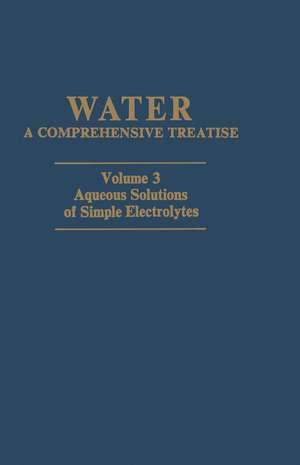Aqueous Solutions of Simple Electrolytes: Water
Autor Felix Franksen Limba Engleză Paperback – 15 iul 2012
Preț: 398.35 lei
Nou
Puncte Express: 598
Preț estimativ în valută:
76.23€ • 79.30$ • 62.94£
76.23€ • 79.30$ • 62.94£
Carte tipărită la comandă
Livrare economică 14-28 aprilie
Preluare comenzi: 021 569.72.76
Specificații
ISBN-13: 9781468429572
ISBN-10: 1468429574
Pagini: 496
Ilustrații: XVIII, 472 p. 1 illus.
Greutate: 0.66 kg
Ediția:Softcover reprint of the original 1st ed. 1973
Editura: Springer Us
Colecția Springer
Seria Water
Locul publicării:New York, NY, United States
ISBN-10: 1468429574
Pagini: 496
Ilustrații: XVIII, 472 p. 1 illus.
Greutate: 0.66 kg
Ediția:Softcover reprint of the original 1st ed. 1973
Editura: Springer Us
Colecția Springer
Seria Water
Locul publicării:New York, NY, United States
Public țintă
ResearchCuprins
1 Thermodynamics of Ion Hydration.- 1. The Thermodynamic Theory of Solvation.- 2. Molecular Interpretation.- 3. Hydration of Gaseous Ions.- 4. Other Thermodynamic Properties of Ions at Infinite Dilution in Water.- 5. Solvent-Isotope Effect in Hydration.- 6. Reference Solvents.- 7. Ionic Hydration and Excess Properties.- 2 Thermodynamics of Aqueous Mixed Electrolytes.- 1. Introduction.- 2. Theoretical Framework.- 3. Experimental Techniques.- 4. Experimental Results and Discussion.- 3 Hydration Effects and Acid-Base Equilibria.- 1. Ionization of Liquid Water.- 2. Hydration of H+ and OH?.- 3. Organic Acids and Bases in Aqueous Solution.- 4 Ionic Transport in Water and Mixed Aqueous Solvents.- 1. Introduction.- 2. Measurement.- 3. Limiting Ionic Conductances in Binary Solutions.- 4. Mechanism of Ionic Conductance.- 5. Limiting Ionic Conductance in Aqueous Solvent Mixtures.- 5 Infrared Spectroscopy of Aqueous Electrolyte Solutions.- 1. Introduction.- 2. Information on Aqueous Ionic Solutions Obtainable from Infrared Analysis.- 3. Experimental Methods.- 4. Critical Review of Available Infrared Data.- 5. Conclusion.- 6 Raman Spectroscopy of Aqueous Electrolyte Solutions.- 1. Discussion.- 2. Raman Bands Arising from Solutes.- 3. Raman Bands Arising from the Solvent: Liquid Water.- 4. Addendum.- 7 Nuclear Magnetic Relaxation Spectroscopy.- 1. Introduction.- 2. Nuclear Magnetic Relaxation.- 8 Dielectric Properties.- 1. Basic Theory.- 2. Experimental Methods.- 3. Characteristic Quantities Derived from Complex Permittivity Measurements.- 4. Information from the “Static” Permittivity.- 5. Information Obtainable from the Dielectric Relaxation Time with the Help of the Proton Magnetic Relaxation Rate.- 6. The Influence of Small Cations on the Dielectric Relaxation Time.- 7.Summary.- References.- Compound Index.- Formula Index.



















